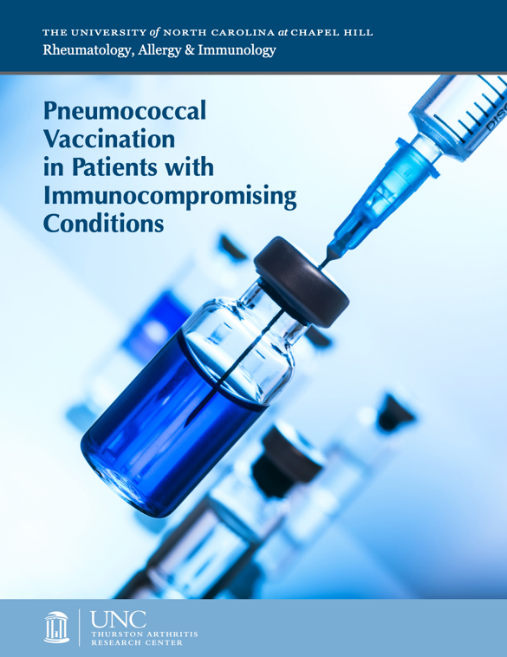Overall Goal of the Project
The most significant barrier to vaccination coverage identified by the Centers for Disease Control and Prevention (CDC) is lack of knowledge about vaccines among adult patients and providers1. Several studies have demonstrated that rate of vaccinations among high-risk populations was highly correlated with information conveyed to patients by healthcare providers. This underscores the crucial role that providers have in positively influencing patient acceptance of vaccination2-5. The goal of this project is to promote awareness of the utility of pneumococcal vaccination in patients with immunocompromising and chronic inflammatory conditions on immunosuppressive therapy through the education of healthcare providers.
Target Groups and Populations
Dissemination of the educational activity was directed at healthcare providers delivering care to immunocompromised patients at risk of developing invasive pneumococcal disease (IPD). This includes physicians, nurse practitioners and physician assistants in primary care (family medicine and internal medicine) and sub-specialty clinics including rheumatology, allergy and immunology, gastroenterology, pulmonary, infections diseases, nephrology, and hematology and oncology.

This intervention is available as a continuing medical education (CME) activity in partnership with the American Academy of Allergy, Asthma, and Immunology (AAAAI). In addition, a monograph is available for distribution in print and electronic format. This activity highlights the most recent Advisory Committee on Immunization Practices (ACIP) recommendations and current literature supporting pneumococcal vaccination in immunocompromised patients. A post-CME-activity survey assesses the knowledge and impact gained through participation.
Gaps in knowledge are addressed effectively through educational content, interactive CME and electronic medical record (EMR) active reminders. Within the University of North Carolina (UNC) system, specialized EMR system vaccination reminders (best practice advisory [BPA]) will be implemented.
Intended Outcomes (Measures and Metrics)
Vaccination prevalence for both Pneumococcal polysaccharide vaccine-23 (PPSV23, Pneumovax) and Pneumococcal conjugated vaccine-13 (PCV13, Prevnar-13) fell roughly between 4–7% in 2018 following a peak of 7–8% in 2016 when a similar vaccination-focused CME activity was launched. We expect the immunization rates for pneumococcal vaccines will increase at least 20–25% from the baseline data measured from 2013–2018. This hypothesis is based on our previous experience with a similar educational activity conducted within our division to improve overall vaccination rates in immunocompromised patients. Following the distribution of the monograph, we will re-query the Carolina Data Warehouse for Health (CDW-H) to examine the pneumococcal vaccination status of the patient cohort and compare these rates preceding this CME activity.
Impact on Learners and Dissemination
- Baseline data for pneumococcal vaccination rates from 2013–2018 in the UNC healthcare system has been acquired.
- As of Nov. 1, 2020, our CME activity was launched live on the AAAAI website.
- The EMR statement has been crafted and is awaiting implementation throughout the UNC system.
- Abstracts are currently in preparation for national meetings.
Impact of COVID
There has been a lack of focus on non-COVID projects due to the investment in COVID-related needs and education. This shift in clinical care and prioritization has affected the creation and distribution of the monograph as well as implementation of the EMR BPA. While the dissemination of this activity to certain professional societies has been delayed, our CME activity is live online, available to a national audience. These challenges have the potential to limit timely uptake of the activity and subsequent data collection.
Impact Related to Pneumococcal Vaccination Rates
We expect to see foreseeable variation in the data collected in vaccination rates during 2020. We speculate this change to be influenced by the transition to telemedicine visits during the pandemic, which would accompany a decrease in vaccination rates. However, acknowledging the shift in sensitivity to respiratory vaccinations among healthcare workers and the public population, we would expect this to increase influenza and pneumococcal vaccination rates.
Lessons Learned
The efficacy of our project and intended outcomes have yet to be evaluated as we are within the process of obtaining data. We recognize that this project can extend our scope to include education of allied health members in addition to our providers (CME and CCE). Our outreach efforts can be broadened, in a cost-effective strategic manner, by an intentional focus on electronic distribution of the monograph.
References
- General Recommendations on Immunization – Recommendations of the Advisory Committee on Immunization Practices (ACIP). MMWR Recomm Rep, 2011; 60:1-64.
- Shigayeva A, Rudnick W, Green K, Chen DK, Demczuk W, Gold WL, Johnstone J, Kitai I, Krajden S, Lovinsky R, Muller M, Powis J, Rau N, Walmsley, S, Tyrrell G, Bitnun A, McGeer A; Toronto Invasive Bacterial Diseases Network. Invasive Pneumococcal Disease Among Immunocompromised Persons: Implications for Vaccination Programs. Clin Infect Dis, 2016; 62(2):139-47
- Harrison N, Poeppl W, Miksch M, Machold K, Kiener H, Aletaha D, et al. Predictors for Influenza Vaccine Acceptance Among Patients with Inflammatory Rheumatic Diseases. Vaccine, 2018; 36:4875-9.
- Loubet P, Verger P, Abitbol V, Peyrin-Biroulet L, Launay). Pneumococcal and Influenza Vaccine Uptake in Adults with Inflammatory Bowel Disease in France: Results From a Web-based Study. Dig Liver Dis, 2018; 50:563-7.
- Lawson EF, Trupin L, Yelin EH, Yazdany J. Reasons for Failure to Receive Pneumococcal and Influenza Vaccinations Among Immunosuppressed Patients with Systemic Lupus Erythematosus. Semin Arthritis Rheum, 2015; 44:666-71.